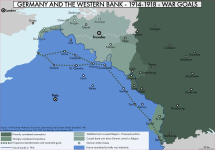Jackson Lennock
Well-known member
Many online like copy + pasting the historic German revanchism onto France in Central Powers victory discussions. But I think this is unlikely.
Revanchism. Unlike Germany, which from the average person's perspective seemed to be on the verge of victory before suddenly surrendering, here the French will not have an easy narrative of a stolen victory. Plus, WWI technically was the second round of Franco-German tumult. France had a defeatist movement historically after winning the war, so I'm not sure . On the other hand, the generals may blame the left (like soldiers revolting in the trenches) and Petainist-style movements could develop too. But that's not the same as outright revanchism.
Britain? France perhaps could also blame the British and Americans. "If only the British had committed more," etc. etc. etc.
There's also the fact that in any 1918 CP victory, Britain is still winning out in the colonial game. Britain by Spring 1918 has Jerusalem, Baghdad, Tanganyika, Namibia, etc. and isn't giving that stuff back. France on the other hand loses territory, pays an indemnity, doesn't get middle eastern gains, and probably doesn't get African gains either. They'd likely be bitter towards the Brits over this.
European conflict or cooperation? The French and Germans nearly formed a proto-European Union OTL under Locarno Diplomacy and the Briand-Stresemann agreement. A defeated France may just accept the reality that Germany is top dog on the continent and adjust itself accordingly. Or they may just pursue a strategy of national autarky (like British-style imperial preference) and focus on internal development.
I think an autarkic, sort of left-nationalist France makes sense, but that's just a guess. The narrative could go that France fought better and more honorably than the Germans, but was simply outgunned by the Germans (sort of American Lost Causers saying that about the North) and was wrong to go to war in support of other nations (Russia, Serbia, etc.) and in reliance on other nations (Britain, America, etc.).
Revanchism. Unlike Germany, which from the average person's perspective seemed to be on the verge of victory before suddenly surrendering, here the French will not have an easy narrative of a stolen victory. Plus, WWI technically was the second round of Franco-German tumult. France had a defeatist movement historically after winning the war, so I'm not sure . On the other hand, the generals may blame the left (like soldiers revolting in the trenches) and Petainist-style movements could develop too. But that's not the same as outright revanchism.
Britain? France perhaps could also blame the British and Americans. "If only the British had committed more," etc. etc. etc.
There's also the fact that in any 1918 CP victory, Britain is still winning out in the colonial game. Britain by Spring 1918 has Jerusalem, Baghdad, Tanganyika, Namibia, etc. and isn't giving that stuff back. France on the other hand loses territory, pays an indemnity, doesn't get middle eastern gains, and probably doesn't get African gains either. They'd likely be bitter towards the Brits over this.
European conflict or cooperation? The French and Germans nearly formed a proto-European Union OTL under Locarno Diplomacy and the Briand-Stresemann agreement. A defeated France may just accept the reality that Germany is top dog on the continent and adjust itself accordingly. Or they may just pursue a strategy of national autarky (like British-style imperial preference) and focus on internal development.
I think an autarkic, sort of left-nationalist France makes sense, but that's just a guess. The narrative could go that France fought better and more honorably than the Germans, but was simply outgunned by the Germans (sort of American Lost Causers saying that about the North) and was wrong to go to war in support of other nations (Russia, Serbia, etc.) and in reliance on other nations (Britain, America, etc.).



